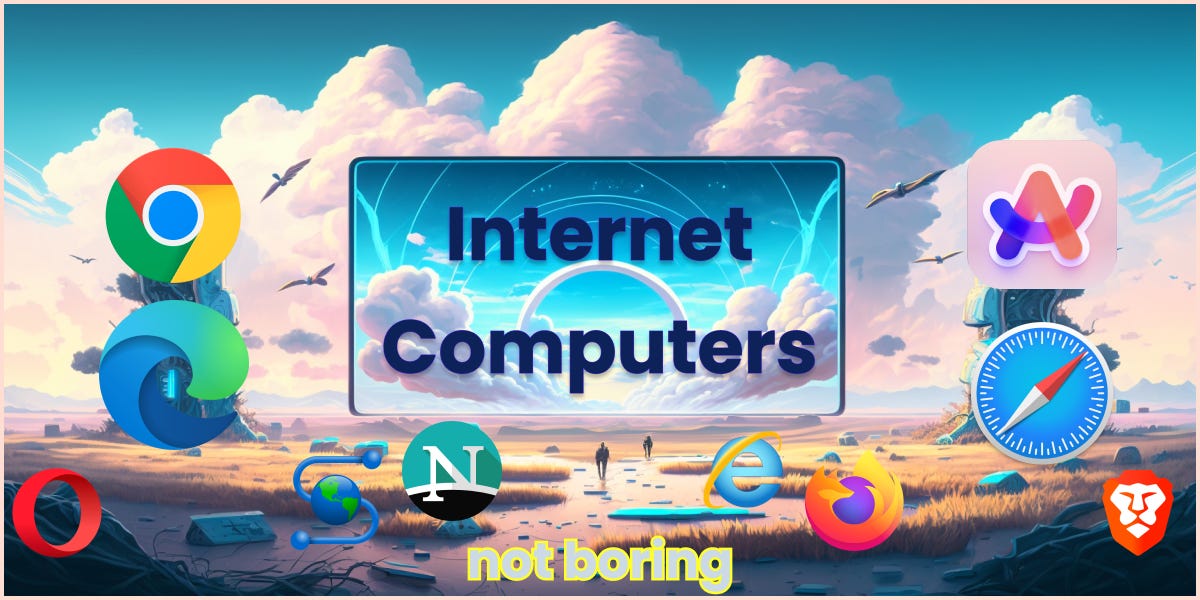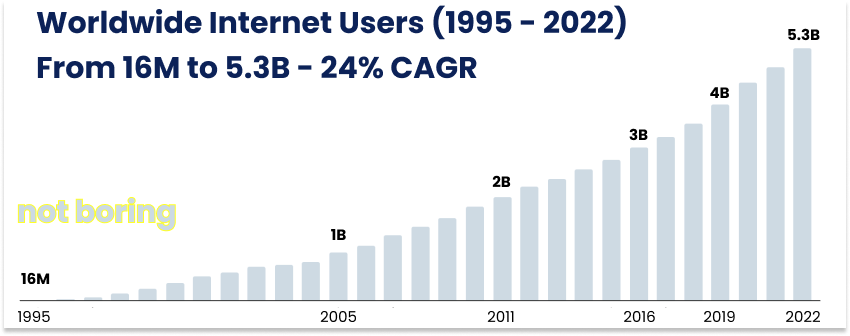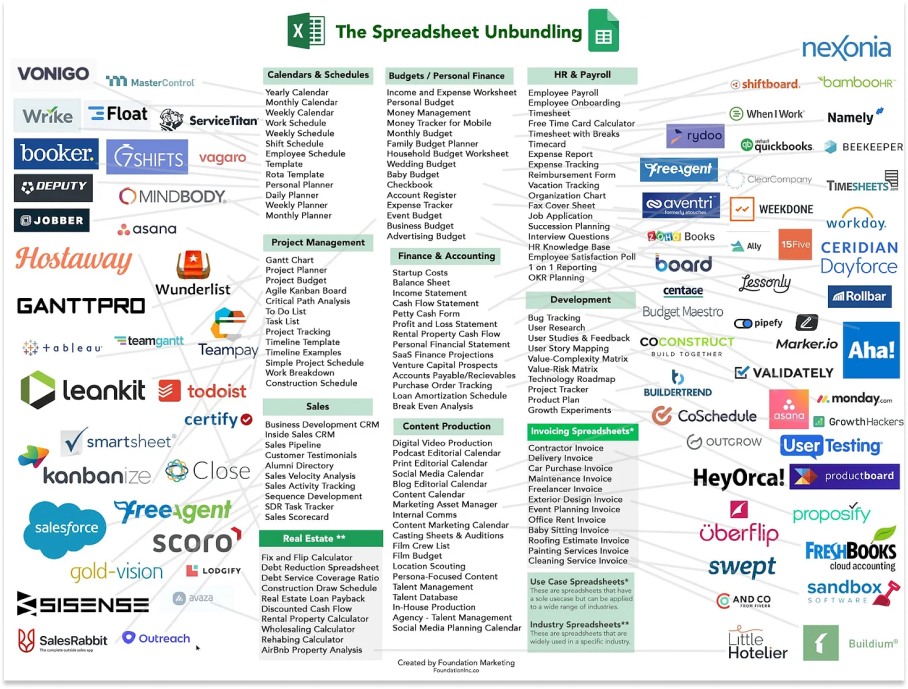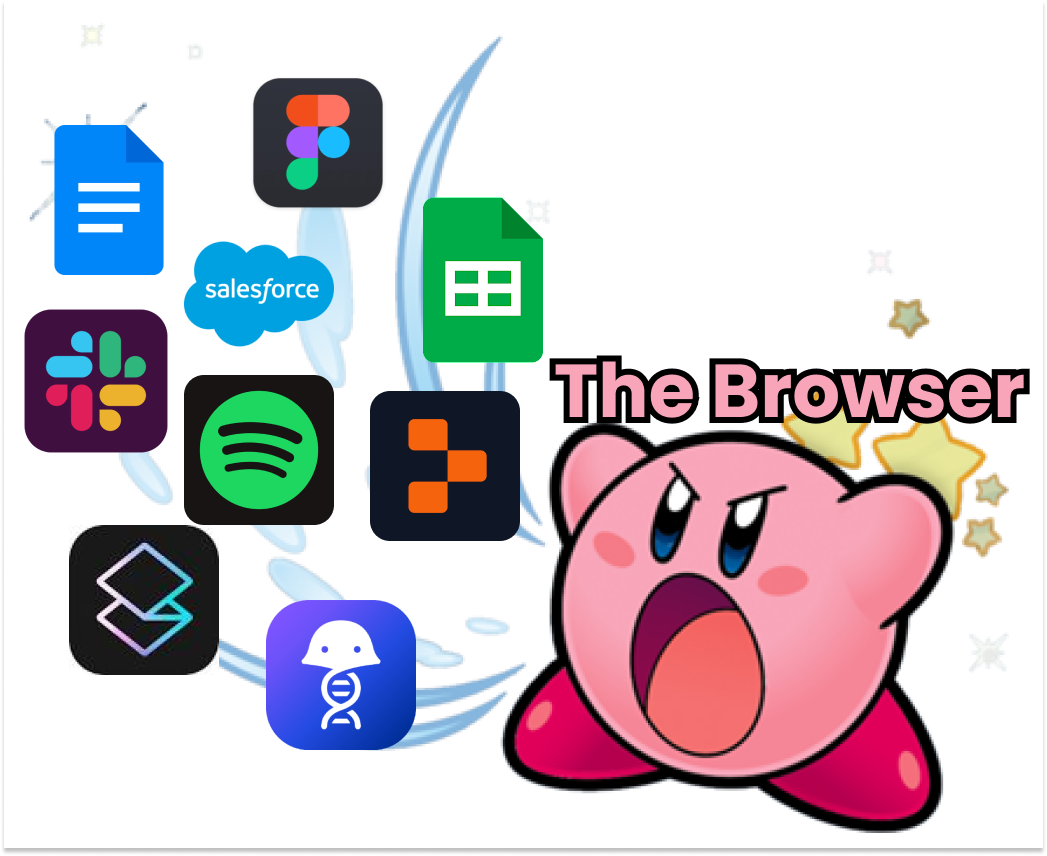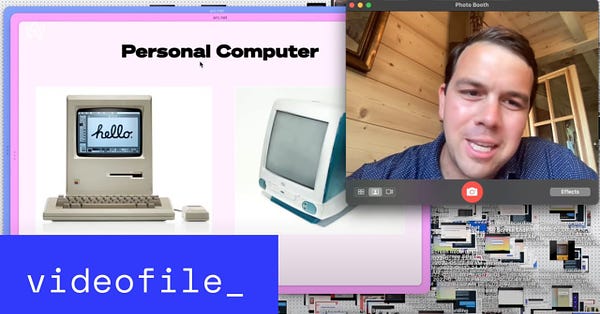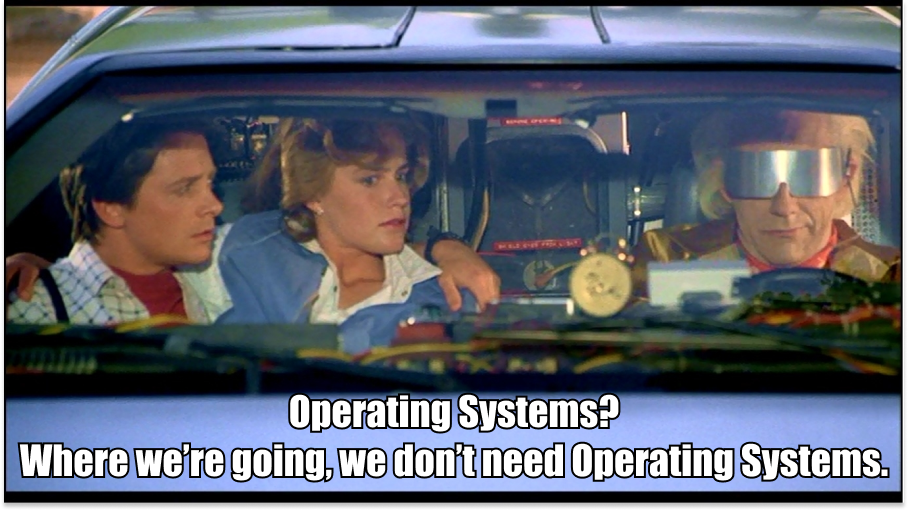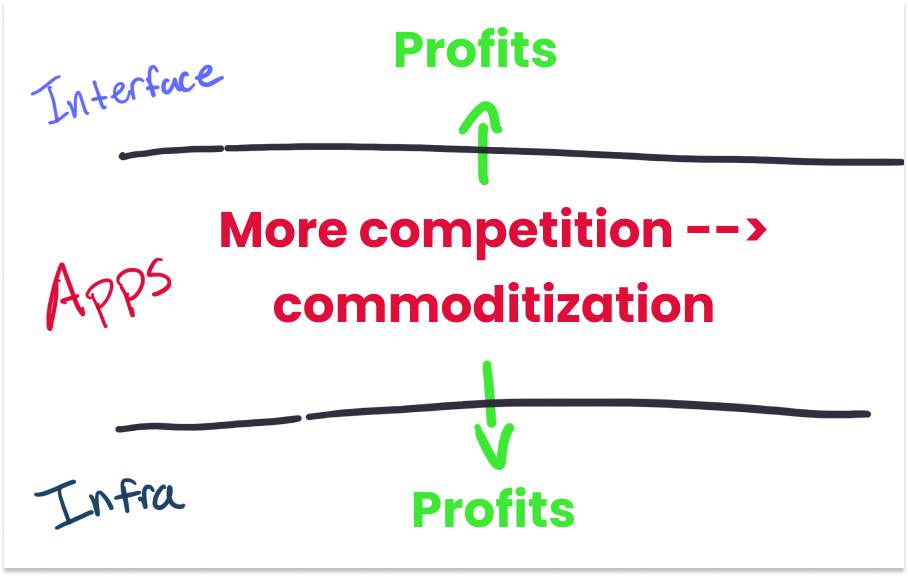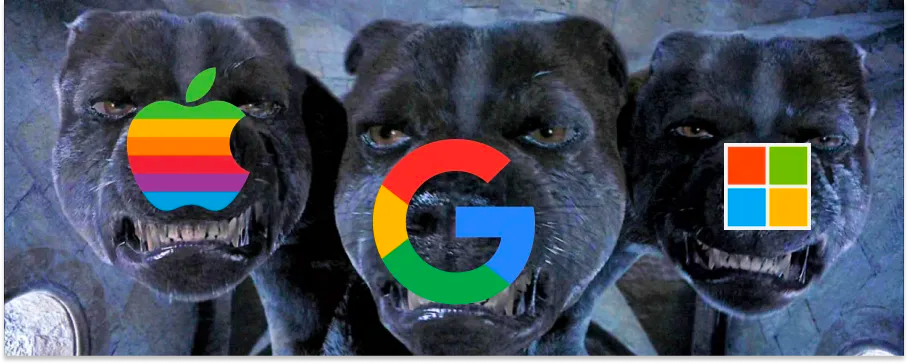Not Boring by Packy McCormick - Internet Computers
Welcome to the 1,138 newly Not Boring people who have joined us since last Tuesday! If you haven’t subscribed, join 189,368 smart, curious folks by subscribing here: Hi friends 👋, Happy Monday! After a hectic start to the year, we’re back in the Monday slot hitting your inbox with 12k words to kick off the workweek and it feels good. Back in September, I asked Twitter for their most magical tech experiences of the past year. In second place, sandwiched between generative art and crypto wallets, two topics I’ve written a bunch about, was the product I use more than any other: Arc by The Browser Company (you can skip the waitlist with that link, btw). After I saw the poll results, and wrote a little bit about Arc in Indistinguishable from Magic, I knew I wanted to write a full piece about the company. Originally, the main question I had in mind was: why would such a talented team with the ability to craft such a delightful product waste their prime years building a browser? Chrome has the market on lock. I viewed their efforts as an amazing contribution to consumer surplus. But when The Browser Company’s CEO Josh Miller reached out to thank me for the kind words about Arc and offering to explain the company’s big vision, I took him up on it, and about three minutes into our call (a good, old fashioned phone call), I knew this piece was going to be much bigger than Arc. Since the launch of the first modern browser, Mosaic, thirty years ago, the browser has been the turf on which some of tech’s biggest battles have been fought. Given its place in the tech stack as the window between the user and the World Wide Web, it’s a powerful demand traffic controller and a unique beneficiary of all of the innovation that goes on beneath its surface. And even when the Wars seem won, when Chrome seems locked in as Internet Explorer did before it and Netscape Navigator did before that, something shifts in the internet landscape and opens the door for new competitors with a fresh approach. I think we might be in one of those moments right now. With AI as a catalyst, the giants are signaling their intent to do battle in the browser once more. But I, of course, am rooting for the underdog with the freshest product: The Browser Company. Theirs is the Internet Computer I hope everyone is using when the dust settles. This is not a Sponsored Deep Dive, the Browser Company isn’t paying me, and I’m (sadly) not an investor; I just genuinely love the product and think that the Third Browser War is one of the most interesting stories in tech that not enough people are talking about. It reveals the giants’ strategies - their strengths and weaknesses, packages up the history of the internet, and hints at the way billions of people will spend hours every day in the near future. Let’s get to it. Today’s Not Boring is brought to you by… Masterworks As we’ll cover today, everything is moving to the cloud. That’s true of obvious things like apps and data, but it’s true of less obvious, more beautiful things, too… like art. I don’t own much great physical art, other than a set of vibrant Takashi Murakami prints that a friend gave to me. I can’t afford the good stuff. But on the internet, I own paintings by Basquiat, Haring, Warhol, and even Picasso. Well, I own shares in those paintings at least, thanks to Masterworks. I’ve been working with Masterworks for years, and personally investing with them the entire time. In the beginning, before they’d sold any of the pieces they’d purchased, I just thought it was a really cool way to access an inaccessible and less correlated asset class while beautifying my portfolio. Over the past year, though, they’ve begun selling works in the portfolio for a gain. In fact, every single one of Masterworks’ 11 exits to date has returned a profit to their investors, totaling more than $30 million in payouts. A majority of those sales weren’t in the go-go era of “everything goes up”, meme stocks, and bitcoin at 60k… but while inflation soared to decade highs, and financial markets plummeted. They’re proving out their thesis: that art can perform well even when other assets don’t. New offerings are launching every week, and tend to sell out fast. But as a longtime partner I’ve secured some VIP passes to skip their waitlist at the Not Boring link: See important Regulation A disclosures here. Internet ComputersThere may be no application better positioned to benefit from the rush of rapid innovation we’re swimming in than the humble browser. I say humble, because admit it: you take your browser for granted. The browser has become so synonymous with the internet, and the internet has become so enmeshed with our lives, that it’s become like the water in that David Foster Wallace speech:
What the hell is browser? Like a surfer who paddles with the strength of the gods, the browser has both created and ridden the biggest technological wave in history. A stunning 5.3 billion people use browsers to access the wonders of the World Wide Web, an enormous number that has grown 24% since 2019. One-third of the Earth’s population, 2.7 billion people, are yet to come online. When they do, rest assured, they’ll access it through a browser, whether on their phone, their desktop, or some futuristic hardware. This is a piece about which browser they might use, and how. Browser usage is a relatively recent phenomenon, a decade more recent than Excel. When Marc Andreessen launched Mosaic in January 1993, less than 1% of the tiny number of netizens used a browser. Six months in, 100,000 people connected to the internet through Mosaic. By December of that year, Mosaic counted 1 million nerds as its earliest users. By the time Andreessen’s next browser company, Netscape, IPO’d in 1995, there were 16 million people online. Nine years later, Facebook debuted to an internet audience of 745 million. The next year, in 2005, the internet crossed the 1 billion mark. Now, 5.3 billion of us live online. Over that same period, the time we spend in browsers has increased with the browser’s capabilities. I just braved my Screen Time Report and discovered that each week, I spend roughly one day’s worth of hours in my browser. I have an especially online job, and it’s hard to find broad browser usage data to back up my personal anecdata, but one way to ballpark it is by thinking about all the things that browsers can do today that they couldn’t before. If one of the most remarkable things about Excel is that it’s thrived despite the unbundling of its peripheral functionality into hundreds of specialized apps…
… then perhaps the most incredible thing about the browser is how much of our digital activity it’s been able to inhale. In fact, as Excel and other desktop applications have gotten unbundled and turned into cloud-based SaaS products, the browser has been a major beneficiary. The biggest tech acquisition of the past year – Adobe’s now-contested $20 billion acquisition of Figma – is a win for the browser. All of the “Figma for X” companies that followed in its wake are a win for the browser. Products like Replit that bring the IDE online are a win for the browser. Any time an application moves from your dock to a tab, that’s a win for the browser. The browser is this incredible application that seems to only get stronger with each new tech cycle. When the vast majority of users interact with web3, they do it through the browser. AI has been an unmitigated boon for the browser, one that will only accelerate as intelligence moves up a layer, from walled apps to the browser itself. As Microsoft CEO Satya Nadella put it at the Bing AI reveal event in February, “We’re going to have this notion of a co-pilot that’s going to be there across every application canvas, inside of an operating system shell, in a browser.” An “operating system shell” is a technical term. The shell is the part of the OS that users interact with, on top of the hardware and kernel and below applications. But as Nadella, the CEO of the company that has made more money from operating systems than any other in world history, hints, the OS itself is becoming an empty shell. The action is moving to the browser. This idea – that we’ll no longer need traditional operating systems, that we’ll just access cloud software through the browser on whichever screen is closest at hand – is what The Browser Company CEO Josh Miller calls ✨ Internet Computers ✨.  At @browsercompany, we believe that the successor to the Personal Computer will be...
✨ Internet Computers ✨
Here's an early version of our dream for Arc (and the internet!) that we shared with our members last week:
In Internet Computer World, you don’t need to download apps on your desktop or your phone. They all live in the browser, and the browser becomes the OS. And unlike Chrome, the world’s most popular browser, the Internet Computer stays in sync across all of your devices. Across any device. If you want to present on the nearest TV screen, you just log into your Internet Computer and pull up the presentation tab. If you start a Not Boring essay on your computer and you have to go to work, you can pick up right where you left off on your phone. The device itself is relatively unimportant in Internet Computer World – it’s commoditized. Anything with a screen and an internet connection will do. “If you smash the computer in front of you right now,” Josh told me, “you wouldn’t lose anything.” The hardware itself becomes the empty shell for the browser; the browser is how you pull all your stuff down from the cloud. The browser has had an unparalleled thirty year run. While Excel Never Dies, the Browser Keeps Getting Stronger. And now, the stars are aligned for browsers to wipe out traditional operating systems once and for all. In Differentiation, I wrote:
This is classic Clayton Christensen stuff, namely The Law of Conservation of Attractive Profits: “The law states that when modularity and commoditization cause attractive profits to disappear at one stage in the value chain, the opportunity to earn attractive profits with proprietary products will usually emerge at an adjacent stage.” I think the value from the app battle will emerge at two stages: below and above. Fierce competition at the app layer will create value that can be captured at the infrastructure layer (below) and interface layer (above). We’ll talk about the infrastructure layer in another post – think chips, cloud providers, APIs, and protocols – and we’ll focus on the interface layer (above) in this one. “He who controls the interface, controls the universe.” Just who gets to control the Browser du Jour is another question: The Browser Wars have been fought across decades, in software and courtrooms, among tech’s biggest players. Today, Google Chrome dominates the space, with an absurd 65.7% market share. But every ten years or so, a new Browser War begins, and Nadella’s renewed interest in the browser – Microsoft Edge is a name I’d heard maybe twice in the past five years until a month ago – signifies the beginning of a new Browser War. The Browser Wars are not for the faint of heart. To win, you need to compete against a three-headed monster of the world’s largest and most powerful tech companies. The battlefield is littered with smaller foes: Mosaic, Netscape, Mozilla, Opera, Flock. The Browser Company is the latest in a long line of hopefuls. The new Browser War is such a compelling topic because it hits so many rich veins:
There are two big questions to ask here:
We’ll dive into all of this and more. To read on, click the link: Thanks to Josh and Darin for your input, and to Dan for editing! That’s all for today! We’ll be back in your podcast feeds this week and your inbox on Friday for that Weekly Dose of Optimism. Thanks for reading, Packy Not Boring by Packy McCormick is free today. But if you enjoyed this post, you can tell Not Boring by Packy McCormick that their writing is valuable by pledging a future subscription. You won't be charged unless they enable payments. |
Older messages
Weekly Dose of Optimism #32
Friday, March 3, 2023
Insulin Price Cuts, SpaceX Launch, Mind-Reading, Lower Rents, Build-Nothing Country, Fount
The AppetiZIRP
Tuesday, February 28, 2023
What happens when we don't need to work to survive?
Weekly Dose of Optimism #31
Friday, February 24, 2023
4 Day Work Week, Freak Trees, Quantum Computing, Technological Progress, Necessary Immigration, and Anti-Doomerism.
Love in the Time of Replika
Tuesday, February 21, 2023
Why crypto and AI are perfect bedfellows, actually
Weekly Dose of Optimism #30
Friday, February 17, 2023
What's Our Problem, T1D, Alzheimer's Detection, Binge Drinking, Beautiful Information
You Might Also Like
The Ultimate Personal Branding Playbook Drops January 17th
Friday, January 10, 2025
Let's face it—getting noticed in today's market isn't what it used to be...
How This Weird Site Makes $88/month!
Friday, January 10, 2025
Each week on the Niche Pursuits podcast, we share a couple of weird niche sites. And every once in a while, these sites are making a SIGNIFICANT amount of money. I recently found a WEIRD website making
♦️ How saying no to (some) customers increases your chances of winning big
Friday, January 10, 2025
How Autodesk became a $60 billion company by staying specific... ͏ ͏ ͏ ͏ ͏ ͏ ͏ ͏ ͏ ͏ ͏ ͏ ͏ ͏ ͏ ͏ ͏ ͏ ͏ ͏ ͏ ͏ ͏ ͏ ͏ ͏ ͏ ͏ ͏ ͏ ͏ ͏ ͏ ͏ ͏ ͏ ͏ ͏ ͏ ͏ ͏ ͏ ͏ ͏ ͏ ͏ ͏ ͏ ͏ ͏ ͏ ͏ ͏ ͏ ͏ ͏ ͏ ͏ ͏ ͏ ͏ ͏ ͏ ͏ ͏ ͏ ͏ ͏
Tripling your organic LinkedIn content visibility
Friday, January 10, 2025
Today's Guide to the Marketing Jungle from Social Media Examiner... Presented by social-media-marketing-world-logo It's National Thank Your Customers Week, so thank you Reader! We're
The Single Most Important Thing For Bitcoin Right Now
Friday, January 10, 2025
Listen now (4 mins) | To investors, ͏ ͏ ͏ ͏ ͏ ͏ ͏ ͏ ͏ ͏ ͏ ͏ ͏ ͏ ͏ ͏ ͏ ͏ ͏ ͏ ͏ ͏ ͏ ͏ ͏ ͏ ͏ ͏ ͏ ͏ ͏ ͏ ͏ ͏ ͏ ͏ ͏ ͏ ͏ ͏ ͏ ͏ ͏ ͏ ͏ ͏ ͏ ͏ ͏ ͏ ͏ ͏ ͏ ͏ ͏ ͏ ͏ ͏ ͏ ͏ ͏ ͏ ͏ ͏ ͏ ͏ ͏ ͏ ͏ ͏ ͏ ͏ ͏ ͏ ͏ ͏ ͏ ͏ ͏ ͏ ͏ ͏ ͏
Influence Weekly #371 - How The Military Recruitment Crisis Pushed The Pentagon To Fund MrBeast, TV Stars In A Bid To Woo Gen Z
Friday, January 10, 2025
PayPal Sued Over Browser Extension Allegedly Diverting Creator's Commission
Weekly Dose of Optimism #126
Friday, January 10, 2025
Sana Biotechnology, Memory Processes, METAGENE-1, McDermitt Caldera, More Speech, Enron Egg, Telepathy Tapes x Jesse Michels ͏ ͏ ͏ ͏ ͏ ͏ ͏ ͏ ͏ ͏ ͏ ͏ ͏ ͏ ͏ ͏ ͏ ͏ ͏ ͏ ͏ ͏ ͏ ͏ ͏ ͏ ͏ ͏ ͏ ͏ ͏ ͏ ͏ ͏ ͏ ͏ ͏ ͏
AI gets a third of VC cash
Friday, January 10, 2025
Fund performance data drop; Read online | Don't want to receive these emails? Manage your subscription. Log in The Daily Pitch: VC January 10, 2025 The Daily Pitch is powered by PitchBook's
"Notes" of An Elder ― 1.10.25
Friday, January 10, 2025
If you help enough people get what they want, you'll always get what you want.
Makin’ Lemonade 🍋
Friday, January 10, 2025
The Q1 vibes are real.

